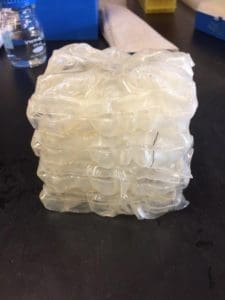Doing More to Avoid Single Use Medical and Lab Supplies
By: Priorclave North America
Category: Lab Innovation

Single use plastics in medical settings are a critical sustainability issue. As Dr. Leana Wen points out in her Washington Post column, “every day, U.S. health-care facilities generate 14,000 tons of waste… Of that waste, up to 25 percent is plastic.” Elsewhere Dr. Wen notes, that “in the United States the health sector is responsible for nearly 9 percent of the nation’s greenhouse gasses. Researchers estimate that the environmental harm caused by medical care ultimately costs as many lives as preventable medical errors, which are responsible for as many as 98,000 deaths annually. This is in direct conflict with the mission of the healing professions.”
One way Dr. Wen proposes to reduce single use plastics in healthcare is through innovation: “There are many single-use plastic products that don’t have an affordable and clinically comparable reusable alternative. Research should focus on designing resilient materials that can be disinfected and reused like metal and glass instruments.”
This is something we at Priorclave know a thing or two about.
Hospitals Aren’t Alone: Research Labs Also Rely Too Much on Single Use Plastics
This daily sustainability problem isn’t unique to healthcare. The average research lab consumes five to eight times more energy than a typical office space of the same size. Labs routinely waste millions of gallons of water each year and dispose of billions of pounds of plastic (and that’s only counting non-hazardous waste plastic).
For example, it isn’t unusual for a single university research lab to regularly consume hundreds to thousands of single-use plastic media plates per month. Producing one pound of polystyrene media plates (i.e., about 36 dishes) takes 11.28 kWh of electricity and 20.54 gals of water. Doing so creates only about 2 ounces of solid solid waste, but emits two-and-a-half pounds of CO2. And that’s just for a few dozen media plates for one lab—a research university often churns through half a million disposable agar plates and petri dishes per year.
Elicia Preston, research scientist and lab manager in the Genetics Department at the University of Pennsylvania Perelman School of Medicine, observed that “her university purchases more than ~400,000 disposable agar plates and petri dishes per year from just a single distributor. ‘This petri dish waste, if lined up, would fill the length of the state of Pennsylvania. In contrast, glass culture dishes are only be manufactured and shipped once, and would only enter landfills when broken.’” 
Helping Labs and Hospitals Move Toward More Sustainable Operations
Priorclave North America CEO Barbra Wells remarks:
“At Priorclave North America we’ve long supported sustainability efforts in the lab and the surgical suite. For example, we’ve worked with the research divisions of several different medical device manufacturers. In one case, researchers were developing a reusable surgical tool for computer-aided knee replacement surgery. They had been using a medical-grade autoclave to sterilize and test the longevity of their device, but it was taking them weeks to run even limited trials. Getting them outfitted with the right research-grade Priorclave completely transformed that. Instead of shipping off-site for testing or engaging in a tedious, manual process in their lab, they were able to run and monitor repeat cycles overnight and through weekends, when they wouldn’t get in the way of their other tasks. When they come in first thing in the morning, their autoclave has already been hard at work without them.”
Because of Priorclave’s flexible controls and accessible design, medical device developers and researchers can do more while tying up fewer resources, in this case pinpointing—with much greater accuracy—how and when their reusable medical devices might fail. And because of that, they are able to innovate smart, new—and reusable—surgical devices. They’re work doesn’t just improve lives, it also helps stem the tide of disposable plastics flooding our planet.
Get in touch with us now to talk about how we can help your lab reduce its reliance on single use supplies, innovate, and accomplish more, every day.

